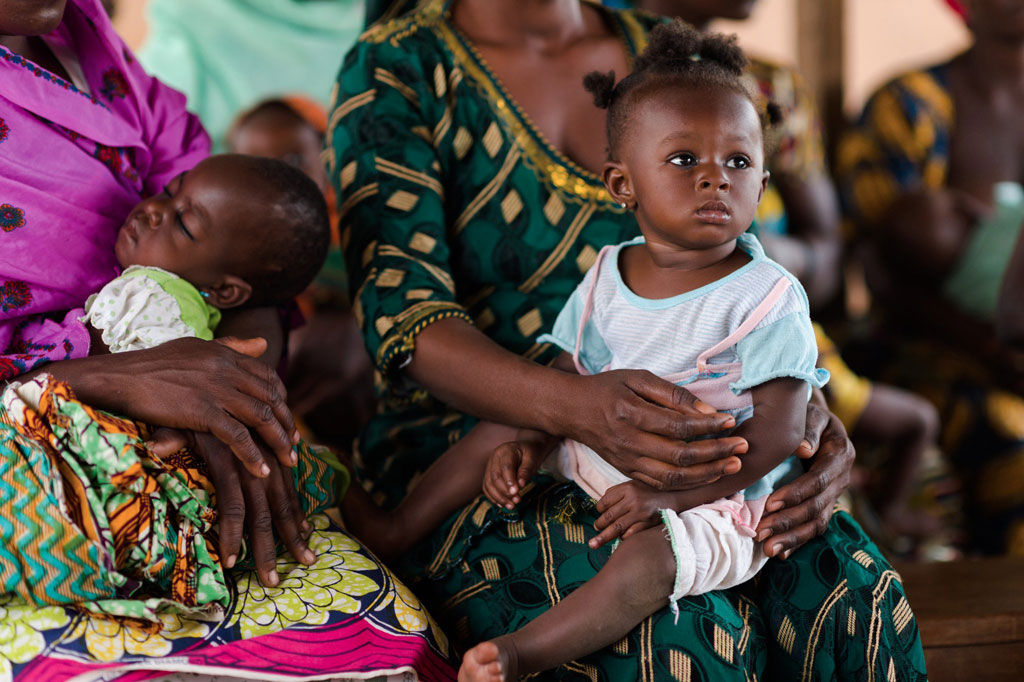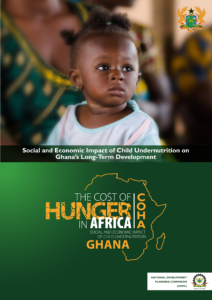Ghana has been losing 6.4 percent of its GDP due to child undernutrition
On 2 August 2016, the new report titled, “The Cost of Hunger in Africa: the Social and Economic Impact of Child Undernutrition on Ghana’s Long-Term Development (COHA)“ was launched in Ghana under the auspices of the National Development Planning Commission. According to the report, the economy of Ghana…

Child malnutrition costs Ghana more than $2 billion annually. Photo: WFP/Nyani Quarmyne

Download the report English
On 2 August 2016, the new report titled, “The Cost of Hunger in Africa: the Social and Economic Impact of Child Undernutrition on Ghana’s Long-Term Development (COHA)“ was launched in Ghana under the auspices of the National Development Planning Commission. According to the report, the economy of Ghana has been losing $2.6 billion annually – or 6.4 per cent of its gross domestic product (GDP) – due to child undernutrition.
Among other findings, the COHA report reveals that:
• 37 percent of the adult population in Ghana suffered from stunting as children;
• 24 percent of all child mortality cases in Ghana are associated with undernutrition;
• child mortality associated with undernutrition has reduced Ghana’s workforce by 7.3 percent.
Vast amounts of Ghana’s GDP is being lost through increased healthcare costs, additional burdens on the education system and lower productivity by its workforce. The consequences of stunting (low height for age) are of particular concern.
“Eliminating stunting is not an option but an imperative issue, because stunted children today mean a stunted economy,” Dr Esther Ofei-Aboagye, Vice Chairperson of the National Development Planning Commission.
Stunting occurs when children miss out on critical nutrients — including proteins, vitamins and minerals — while in the womb and in the first two years of life. This is compounded by diseases and poor hygiene practices. People affected by stunting face lifelong consequences starting in childhood such as frequent illness, poor school performance, having to repeat classes or dropping out altogether, and low workplace productivity.
“Ensuring a generation free from malnutrition requires significant investments in nutrition strategies and interventions. There is therefore a need for Ghana to forge strategic partnerships with key stakeholders, particularly the private sector and non-state actors, to combat undernutrition holistically,” said Prof. Takyiwaa Manuh, Director of the Social Development Policy Division at the Economic Commission for Africa.
The COHA National Implementation Team, which was responsible for collecting, processing and presenting results from Ghana, was composed of Ghana’s Ministries, Departments and Agencies, UN Agencies and other Non-Governmental Organisations concerned with the elimination of child stunting. The Government of Ghana, the African Development Bank, the French Development Agency, the Office of the United Nations Coordination of Humanitarian Affairs (OCHA), the Rockefeller Foundation, and WFP contributed financially to the realisation of this study in Ghana.
Download the report English
View the Press Release
Read a blog by Thomas Yanga of WFP
About the Cost of Hunger in Africa Study
The first report of the Cost of Hunger in Africa (COHA) Study was launched on 28 March 2014 in Abuja, Nigeria, where experts gathered to review results of the report covering Egypt, Ethiopia, Swaziland and Uganda. The studies are led by the African Union Commission, and supported by the African Union Commission, Economic Commission for Africa, the New Partnership for African Development (NEPAD) and the UN World Food Programme (WFP). At present, the study has also been completed in Burkina Faso, Ghana, Malawi, Rwanda, Swaziland, Madagascar and is underway in Chad. In the next phase, the study will be undertaken in Botswana, Cameroon, Kenya, Lesotho, Mozambique and Mauritania.
Learn more about the Cost of Hunger in Africa: The Cost of Hunger in Africa